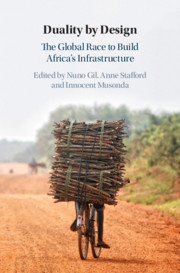‘With a wealth of empirical evidence, this book exposes a fundamental choice underlying infrastructure development in Africa and elsewhere. Western development agencies emphasize institution-building, good governance and transparency with the result that investment is slow. In contrast, Chinese agencies seek to get it done so that investment is quick, but possibly unsustainable. Foreshadows a new era of geopolitics on the African continent.'
Carliss Y. Baldwin - Harvard Business School
‘Africa's capacity for prosperity - which depends on the development of its infrastructure - is central to our way of life for a slate of reasons that are laid out in this terrific book. Gil explains what it will take to assure Africa's stability and security. This is essential reading for scholars interested in the construction of institutions, and for anyone interested in international political economy.'
Anita McGahan - University of Toronto
‘Duality by design: The Global Race to Build Africa's Infrastructure is a rich and thought-provoking work, whose data and conclusions illuminate the Latin American reflection on the challenges in the development of infrastructure projects.'
Rafael Valim - President of the Brazilian Institute of Legal Studies in Infrastructure (2014–16) and editor of the Brazilian Journal of Infrastructure
‘Africa has a rapidly growing population, which is projected to reach forty percent of the world's population by 2100. This rapid growth in population highlights the challenges presented by an infrastructure which is already woefully inadequate. Drawing on an extensive body of research, this book focusses on the incompatibility between building institutions and capital investment, a fundamental question that will become ever more pressing as the growth in population demands better infrastructure to serve it. The Western approach of institutional building as a necessary precursor to investment contrasts sharply with the Chinese focus on speed of investment, a contrast which will become more sharply drawn and debated in the future. This book makes a valuable contribution to that debate and is essential reading for all those interested in the provision of infrastructure to meet the needs of the growing population of Africa.'
John Roberts - Former CEO of United Utilities
‘This book presents a new, probing and insightful slant on the well-trodden discussion of the duality involved in promoting infrastructure development in emerging market countries with weak institutions. Rather than treating this as a dilemma with dichotomous alternatives, each with its pros and cons, this book delivers hard-hitting arguments and multiple case studies to support the idea of looking for hybrid organizational solutions that can maximize the benefits and minimize the risks of both approaches. It poses questions that can help to launch a new set of research and experimentation in support of the aspirations and goals of both the local populations and the grantee countries and multilateral institutions that support infrastructure development. It is well worth a read!'
Raymond E. Levitt - Kumagai Professor of Engineering Emeritus and Director of the Global Projects Center, Stanford University
'Duality by Design is critical reading for anyone wanting to understand the dynamics of global development and the options we have for constructing a world that serves us all. It provokes us to think differently, to see alternative paths to progress, to more deeply understand challenges in developing economies, to open a more expansive conversation and to engage in a constructive debate about our collective future.'
Sara Beckman - University of California, Berkeley
'Duality by Design: The Global Race to build Africa’s Infrastructure is laying out two development models that are implemented in a vast number of countries across Africa. … One model puts emphasis on investments and enhanced capacity while the other is following an approach of aligning infrastructure investments with much-needed institutional capacity building and governance. Perhaps the two models will need to come together to make a real development impact for the continent. A great start for a much-needed discussion on effectiveness of infrastructure development in Africa.'
Benedict L. J. Eijbergen - The World Bank
'This book has brought together some of the finest minds within the academic and research fields, who have real knowledge and understanding of the complex challenges faced by governments and their international agencies, and global private sector enterprises in responding, at a relevant scale, to the infrastructure needs of Africa. They have articulated the risks of not meeting this urgent challenge, while clearly acknowledging the risks of doing so. They have dared to confront these challenges, and to think very radically; nothing less will suffice.'
Ian Reeves - Chairman, The Estates and Infrastructure Exchange, eix.global





